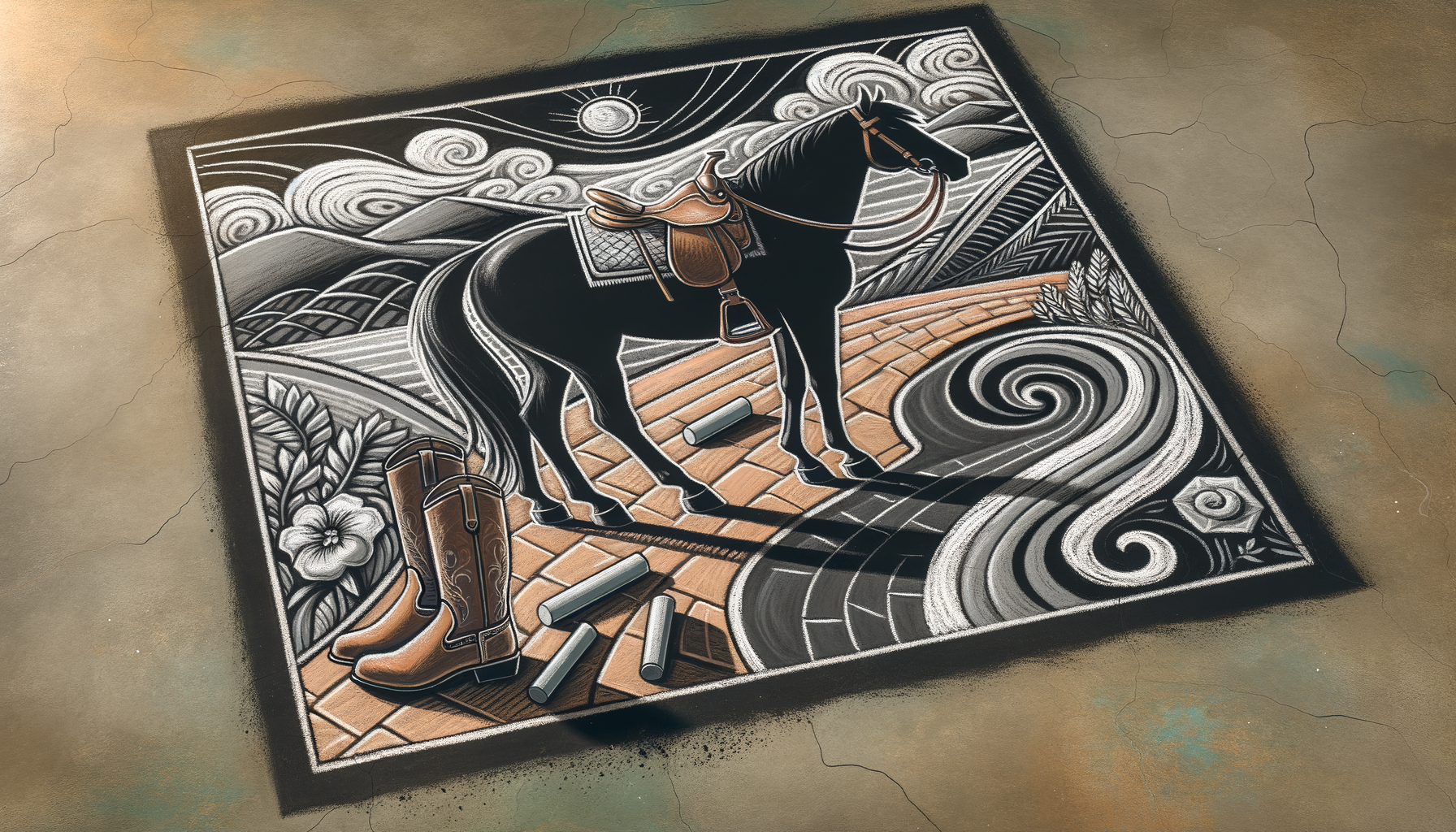Do you remember the first time you tried to ride a bike—or a horse, if you’re from my neck of the woods? That wobble in your knees, the absolute certainty that you were about to topple sideways into a rose bush or a prickly patch of sagebrush? That’s exactly what stepping into a new role feels like: a wild mix of excitement and “Oh no, I have no idea what I’m doing.” And for me, whether I was mustering the courage to saddle a feisty mare as a kid or heading into my first big writing assignment years later, self-doubt has always loomed like storm clouds gathering over Montana's endless sky. Impostor syndrome, as they call it, comes for all of us.
But there’s another truth I learned out here on the plains: the rain doesn’t last forever, and neither does that imposter-y feeling. If you lean in, push forward, and maybe even find a way to laugh at yourself along the way, there’s growth waiting on the other side. So, let’s saddle this thing up and talk about how I (and probably you too) can go from wide-eyed wanderer to saddle-worn expert.
The Impostor Feeling Is Universal—Yes, Even for You
Impostor syndrome has a funny way of sneaking in at the worst times. Like, say, during my first book signing, when someone asked me, “What inspired you to write this?” and my brain immediately responded with, “Who, me? Write this? No idea, honestly.” Instead of basking in the moment for what it was—proof that I had something worth sharing—I found myself unsure how I got there at all.
Sound familiar? Maybe you’re stepping into a new relationship where your partner looks at you like you’re the most interesting person on earth (and you’re secretly wondering when they’ll figure out you’re mostly just good at loading the dishwasher). Or maybe your boss promoted you, and now you’re in charge of people who seem to know a lot more than you. Whatever the situation, trust me: you’re not alone.
Studies back this up. According to one report, about 70% of people feel like impostors at some point. That’s right—nearly every successful person you’ve ever seen has probably thought, Wait, am I really cut out for this? Even Beyoncé. Yes, Beyoncé. If the queen can battle impostor syndrome and still reign supreme, there’s hope for the rest of us.
My Own "Fake It Till You Make It" Moments
One thing Montana has taught me is that reality doesn’t care much for perfection. When you grow up surrounded by ranchers and wranglers, you quickly learn that most skills are a series of awkward attempts until one day, you kinda just…get it. The same goes for learning to navigate the fear of not being enough.
Take my first-ever stint as a summer trail guide. I was 19 and desperate to impress the group of tourists I was tasked with leading on horseback through rugged trails. My internal monologue went something like this: What if they ask me the name of a tree? What if the horses startle when we cross the creek? What if I—God forbid—fall off?
Spoiler: none of that happened. I don’t remember much about the trail ride itself (other than the unbearable heat and a couple from Chicago bickering over sunscreen), but I do remember the feeling of walking away after. I hadn’t been the smoothest guide on the trail, but you know what? I’d done it. That moment taught me the power of simply showing up—even when you don’t think you’re ready.
The truth is, new challenges are never going to feel cozy, like curling up with a quilt by a fire. There’s always going to be that little voice in your head whispering, Are you sure you should be here? But over time, you learn to turn the volume down—and maybe even shout over it.
How to Quiet the Voice of Doubt (And Maybe Learn to Like It)
It’s all well and good to wax poetic about overcoming self-doubt, but what does that actually look like? After years of trying (and often failing) to feel like I “belonged” in a new role, I’ve picked up a few tricks. Here’s what worked for me, and what might just work for you:
1. Flip the Script
That inner impostor voice loves to tell you all the reasons you’re not good enough. Flip the script by focusing on what you bring to the table instead. Maybe you don’t have decades of experience, but you’ve got fresh ideas. Or maybe your knack for empathy more than makes up for your lack of life hacks. Write down these strengths—yes, actually write them—and revisit them when doubt strikes.
2. Actively Embrace the Beginner Role
There’s power in saying, “I don’t know, but I’m here to learn.” In relationships, life, and work, people respect honesty far more than pretense. Trying to be perfect—or worse, pretending to be—creates unnecessary pressure. Instead, cultivate curiosity. Be the person who asks thoughtful questions and isn’t afraid to say, “Tell me more.”
3. Learning Is Your Superpower
Whenever I felt out of my depth as a rookie wildlife coordinator, I reminded myself that every “expert” started somewhere. Whether you’re learning to maintain healthy communication with a partner or figuring out a career path, committing fully to learning takes you one step closer to confidence.
Books, podcasts, conversations, journaling—whatever tools you use, stay in student mode longer than feels comfortable.
4. Celebrate Small Wins
It’s easy to dwell on what you didn’t do perfectly. But in my experience, big milestones are built on smaller, seemingly insignificant victories. In my early days of writing, I’d celebrate landing even one meaningful sentence. Later, those sentences turned into stories, then chapters, then entire manuscripts. Every effort is progress. The same is true for relationships, careers, or any pursuit that matters.
5. Remember: The Fear of Failing Is Evidence You Care
Impostor syndrome feels awful, sure—but it also tells you that you’re stretching yourself. If you didn’t care or weren’t pushing your boundaries, the self-doubt wouldn’t be there at all. It’s uncomfortable, yes, but it’s a sign you’re not settling—and that’s worth something.
Becoming the Expert You Already Are
Years after my days spent guiding trail rides, I attended a book event where a young woman approached me, slightly starry-eyed and holding my first novel. “Your book just…got me,” she said, tears welling up. I thanked her and walked away feeling like the biggest fraud on the continent. Because the truth was, I didn’t feel like a “real” author. I still saw myself as a girl with dirt-caked boots trying to find the right words.
But then I remembered: the ability to connect—to make someone feel seen—is everything I’d set out to do with my writing. And maybe I wasn’t the polished, awards-piling writer I imagined I should be, but I was exactly the writer she needed.
Here’s the thing: “expert” is almost never a title someone gives to you. It’s something you grow into—often without realizing it’s happened. You stop worrying so much about external validation, and you start living in the truth of what you’ve done, what you’ve learned, and what you care about.
Final Thoughts—And a Thought for You
If you can remember my first shaky horseback ride or clumsy story drafts, maybe you can remember this: the only way to outgrow impostor syndrome is to keep showing up—even when the doubt doesn’t budge. It's about starting somewhere, riding through the uncertainty, and making peace with the wobble.
So the next time you find yourself thinking, I don’t belong here, saddle up anyway. Who knows? A trail worth remembering might just be waiting.




















